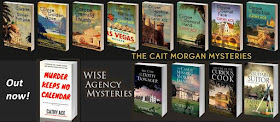BUSINESS: If a major producer/production company wanted to
option or buy your book…but wanted to change it in major ways, as often happens
in Hollywood, would you still sell it? Explain your reasons and your
limitations. But remember, once you sell something to Hollywood, except in
extremely rare instances, you lose control over the film property.
This is an interesting question, and one I believe I would
have answered differently a few months ago. This is a topic which has led me to
many hours of pondering recently, and I have sought counsel from several
authors I know who have already been through the process of having their work
produced for the screen, be it of the large or small variety.
 |
| With author Ann Cleeves and Brenda Blethyn, who brings Vera Stanhope to life on-screen, at Malice Domestic 2018 |
What I have discovered is that the right response to having work “taken over” is different for
different people, and that a certain amount of soul-searching is required to
come up with the right answer for oneself. Do you want to focus on writing
books, and let the production pros get on with their version of your books and
characters? Was your deepest desire always to become a screen writer so you’ll
grab the chance to be 100% on-board and take your novel as just the starting
point for an on-screen adventure that you oversee completely? Or are you
somewhere in between those two extremes?
 |
| With James Runcie, at CrimeFest UK 2016 |
Linwood Barclay recently wrote the screenplay for the movie
based on his book “Never Saw It Coming”, whereas Peter Robinson was absolutely hands-off
the British TV productions of his DCI Banks novels. Ann Cleeves has an
excellent, informal relationship with the company bringing Vera to our screens,
while Maureen Jennings writes one script per season for the Murdoch Mysteries.
James Runcie is an Executive Producer (but chooses to be informed of decisions,
rather than giving input to them) for the Grantchester series, whereas MC
Beaton is a script editor, often on-set, for the Agatha Raisin series.
 |
| With Maureen Jennings, Bloody Words 2014 |
I’m thinking that, for me, it would be best to stand back
and let the pros get on with what they want to do, but to keep the relationship
with the production company lively and interactive. Ultimately, I see myself as
a storyteller, not a film maker, so I can continue to tell my stories, while
film makers interpret them for the screen. All that being said...any of these scenarios is still a dream for me, so you know...take it all with a handful of salt.
I'd be honoured if you'd consider reading my work - you can find out about it, and me, here: cathyace.com


You're right, Cathy. It would probably be best to stand back and let the pros get on with what they do, no matter how hard standing back might be.
ReplyDeleteGiven the chance, yes ��
DeleteI guess you can always refuse to watch a stinky production of your great novels and do as Lee Child did, and laugh (or in his case, chuckle quietly) all the way to the bank.
ReplyDeleteHe did but now he's backing a new TV treatment ��
DeleteIt's a tough choice. And I think you're right about it needing a certain amount of soul searching. There's pluses and maybe minuses to one's work being adapted for the screen...
ReplyDeleteYou're right Paul
Delete